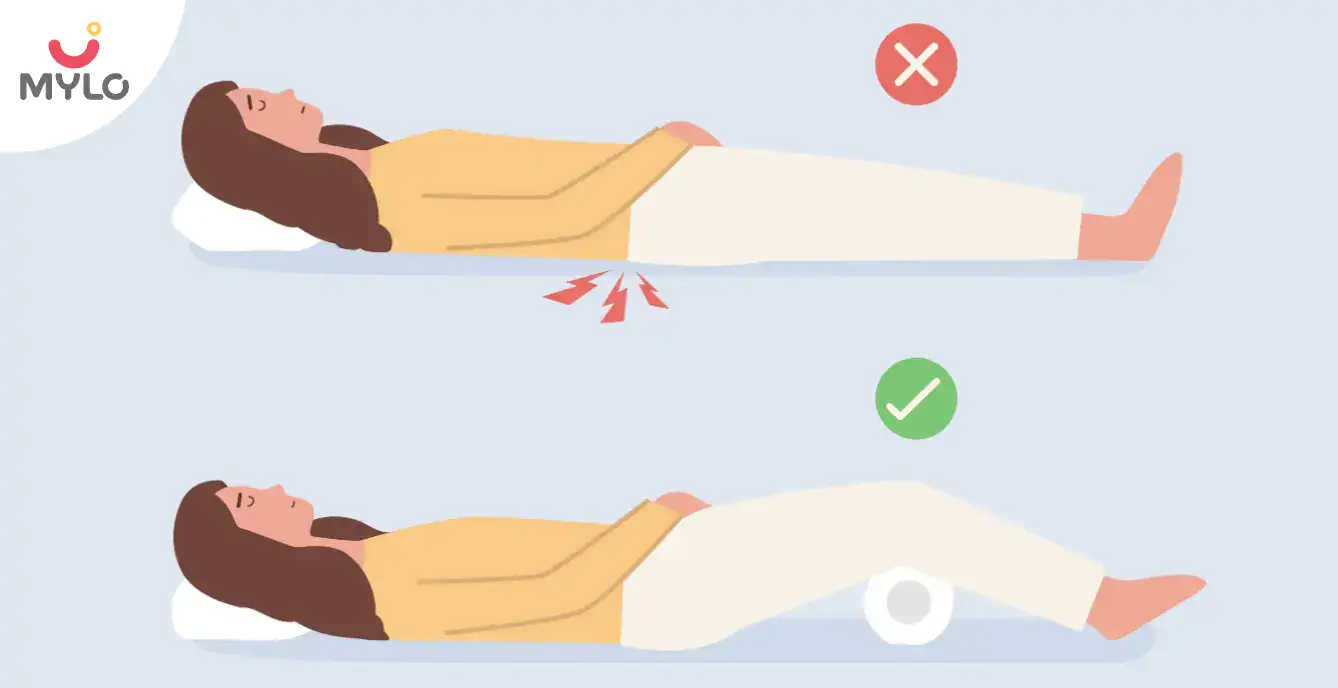Get MYLO APP
Install Mylo app Now and unlock new features
💰 Extra 20% OFF on 1st purchase
🥗 Get Diet Chart for your little one
📈 Track your baby’s growth
👩⚕️ Get daily tips

OR


Article Continues below advertisement
- Home

- In Vitro Fertilization (IVF)

- Positive Signs After Embryo Transfer: What to Look Out For
In this Article
- What is Embryo Transfer?
- Understanding The Process of Embryo Transfer
- What to Expect After Embryo Transfer?
- Day by Day Symptoms After Embryo Transfer
- Days 1-3: Mild cramping, spotting, fatigue
- Days 4-6: Implantation bleeding and increased BBT
- Day 7: Continued cramping and bleeding
- Positive Signs After Embryo Transfer
- 1. Absence of menstrual bleeding
- 2. Light spotting or implantation bleeding
- Body Changes After Embryo Transfer
- No Symptoms After Embryo Transfer, Is it Normal?
- Coping with No Symptoms After Embryo Transfer
- Factors That May Affect the Outcome of Embryo Transfer
- Tips for Managing Anxiety and Stress During the Waiting Period
- When to Consult Your Doctor After Embryo Transfer?
- Conclusion
- References
In Vitro Fertilization (IVF)
 39888
39888Positive Signs After Embryo Transfer: What to Look Out For
Updated on 15 June 2023



Medically Reviewed by
Kusum Sabharwal
Obstetrician & Gynecologist - MBBS| DGO
View Profile

If you're reading this, chances are you've recently undergone embryo transfer procedure, or you're planning to do so soon. Congratulations on taking this big step towards starting or expanding your family! As you wait for the results, it's natural to feel a mix of emotions, from hope and anticipation to anxiety and uncertainty. However, there are several positive signs after embryo transfer that you can look out for that may indicate a successful pregnancy.
In this article, we'll day by day symptoms after embryo transfer and what they mean, so you can stay informed and empowered throughout your journey. Let's get started!
What is Embryo Transfer?
Embryo transfer is a crucial step in the process of assisted reproduction, specifically in vitro fertilization (IVF). It involves the careful placement of fertilized embryos into the uterus of a woman who is trying to conceive. This procedure is typically performed by a skilled fertility specialist in a clinic or hospital setting. The embryos are usually created by combining eggs and sperm in a laboratory, allowing for controlled fertilization and early development.
Article continues below advertisment
Understanding The Process of Embryo Transfer
Before undergoing embryo transfer, patients usually undergo an extensive preparation process, which may include hormone therapy to optimize the chances of successful implantation. The embryos are carefully selected based on their quality and developmental stage. The number of embryos transferred may vary depending on the patient's age, medical history, and the recommendations of the fertility specialist.
During the actual procedure, the patient lies on an examination table, and a speculum is gently inserted into the vagina to provide access to the cervix. A thin catheter containing the embryos is then guided through the cervix and into the uterus. The embryos are delicately released, and the catheter is carefully withdrawn. The entire process is generally painless and takes only a few minutes to complete.
What to Expect After Embryo Transfer?
After the embryo transfer, patients often experience a mixture of emotions, ranging from excitement to anxiety. It is essential to remember that each person's experience may vary, and there is no one-size-fits-all answer to what to expect.
The waiting period between the embryo transfer and the pregnancy test can be emotionally challenging, as patients eagerly anticipate any positive signs after embryo transfer that may indicate a successful implantation.
Day by Day Symptoms After Embryo Transfer
Following embryo transfer, it is common for patients to closely monitor their bodies for any potential signs of pregnancy. It is important to note that body changes after embryo transfer may not be exclusive to pregnancy and can also be caused by hormonal changes or the procedure itself. Therefore, it is crucial to consult with a healthcare professional to obtain an accurate assessment.
Article continues below advertisment
Here are some common symptoms that one may experience day by day after embryo transfer:
Days 1-3: Mild cramping, spotting, fatigue
In the first few days after embryo transfer, it is normal to experience mild cramping, bloating and fatigue. These symptoms are often attributed to the hormonal changes and the physical manipulation of the uterus during the procedure.
Days 4-6: Implantation bleeding and increased BBT
Around five days after embryo transfer, some women may notice an increase in body basal temperature along with implantation bleeding. It's a pink or brown vaginal discharge that some women may observe 3-7 days after the transfer, which may be accompanied by cramping.
Day 7: Continued cramping and bleeding
Light spotting or mild implantation bleeding can continue even after a week of embryo transfer. But it is not necessarily an indication that something is wrong and usually indicates that implantation is taking place.
It is important to note that symptoms don't necessarily indicate success. Some women may experience no symptoms after embryo transfer, is that normal? Yes, it's normal to experience no symptoms after an embryo transfer. The waiting period can be challenging, but it's important to wait until the recommended time to take a pregnancy test.
Article continues below advertisment
Positive Signs After Embryo Transfer
While the absence of symptoms does not necessarily indicate a negative outcome, many patients eagerly search for positive signs that suggest a successful implantation.
1. Absence of menstrual bleeding
One of the most encouraging signs is the absence of menstrual bleeding during the expected time of menstruation. This can be an early indication that the embryo has successfully implanted into the uterine lining.
2. Light spotting or implantation bleeding
Another positive sign is the presence of light spotting or implantation bleeding, which may occur around one to two weeks after embryo transfer. This is a result of the embryo attaching itself to the uterine wall and can be accompanied by mild cramping. However, it is important to note that not all patients experience implantation bleeding, and its absence does not necessarily indicate a negative outcome.
Body Changes After Embryo Transfer
As the embryo continues to develop, some patients may notice subtle changes in their bodies. These changes can include increased sensitivity to smells, changes in appetite, or a heightened sense of fatigue. These symptoms can be attributed to the hormonal changes that occur during early pregnancy. However, it is essential to remember that these symptoms can also be caused by other factors and may not necessarily indicate a successful implantation.
No Symptoms After Embryo Transfer, Is it Normal?
It is entirely normal for some patients to experience no noticeable symptoms after embryo transfer. The absence of symptoms does not necessarily indicate a negative outcome or a failed implantation. Each person's body is unique, and the way it responds to the procedure can vary significantly. Some individuals may only experience subtle or no symptoms at all, while others may have more pronounced signs of early pregnancy.
Article continues below advertisment
Coping with No Symptoms After Embryo Transfer
The waiting period after embryo transfer can be emotionally challenging, particularly for individuals who do not experience any positive signs after embryo transfer. It is crucial to remember that the absence of symptoms does not definitively indicate a negative outcome.
Engaging in relaxation techniques, such as deep breathing exercises, meditation, or gentle yoga, can help manage anxiety and stress during this waiting period. Additionally, seeking support from loved ones or joining support groups with individuals who have gone through similar experiences can provide emotional comfort.
Factors That May Affect the Outcome of Embryo Transfer
Several factors can influence the success of embryo transfer. The quality and developmental stage of the embryos, the age and overall health of the patient, and the expertise of the fertility specialist all play crucial roles.
Additionally, lifestyle factors such as smoking, excessive alcohol consumption, and obesity can impact the chances of successful implantation. It is important to discuss these factors with a healthcare professional to ensure the best possible outcome.
You may also like: Sleeping Position After IVF & Other Precautions That Can Boost Your Chances of Success
Article continues below advertisment
Tips for Managing Anxiety and Stress During the Waiting Period
The waiting period after embryo transfer can be filled with anxiety and stress. To manage these emotions effectively, it is essential to adopt healthy coping strategies.
Engaging in activities that promote relaxation and well-being, such as practicing mindfulness, engaging in light exercise, or pursuing hobbies, can help distract from negative thoughts and reduce stress levels.
It is also important to maintain open communication with a healthcare professional to address any concerns or questions that may arise.
When to Consult Your Doctor After Embryo Transfer?
While it is normal to experience some anxiety during the waiting period after embryo transfer, there are certain situations in which it is advisable to consult with a healthcare professional. If severe pain, heavy bleeding, or fever occurs, it is essential to seek immediate medical attention, as these symptoms may indicate a potential complication.
Additionally, if there are any concerns about medication, lifestyle choices, or emotional well-being, it is important to reach out to a healthcare professional for guidance and support.
Article continues below advertisment
Conclusion
Embryo transfer is a significant milestone in the journey towards achieving pregnancy through assisted reproductive techniques. While it is natural to eagerly search for positive signs after embryo transfer, it is important to remember that every person's experience may be different. Some individuals may experience noticeable symptoms, while others may not. The waiting period can be emotionally challenging, but it is crucial to maintain a positive mindset and seek support when needed.
References
Bortoletto P, Bakkensen J, Anchan RM. (2018). Embryo transfer: timing and techniques. Minerva Endocrinol.
Sõritsa D, Mäestu E, Nuut M; et al. (2020). Maternal physical activity and sedentary behaviour before and during in vitro fertilization treatment: a longitudinal study exploring the associations with controlled ovarian stimulation and pregnancy outcomes. J Assist Reprod Genet.





Medically Reviewed by
Kusum Sabharwal
Obstetrician & Gynecologist - MBBS| DGO
View Profile


Written by
Shaveta Gupta
An expert in content marketing, Shaveta is an alumnus of IIT, Bombay, she knows what the audience is looking for. Mother of a 6 year old, she has been instrumental in planning the content strategy at Mylo.
Read MoreGet baby's diet chart, and growth tips

Related Articles
RECENTLY PUBLISHED ARTICLES
our most recent articles

IVF Pregnancy
Sleeping Position After IVF & Other Precautions That Can Boost Your Chances of Success
(4,274 Views)

Celebrate Breast Feeding Week
Disadvantages of Breastfeeding No One Tells You About
(4,610 Views)

IVF Pregnancy
IVF Failure Reasons: Exploring the Challenges Couples Face with Infertility
(1,910 Views)

Ayurveda & Homeopathy
Putrajeevak Beej: The Ancient Seed for Modern Health and Fertility
(2,605 Views)

Fertility
Shivlingi Beej: The Ultimate Guide to Boosting Your Fertility Naturally
(5,969 Views)

Ayurveda & Homeopathy
Milk Thistle in Ayurveda: Unlock The Healing Potential and Health Benefits of This Herb
(1,079 Views)
- Orchidopexy: All You Need to Know About Its Procedure, Risks, and Recovery
- Transvaginal Ultrasound: A Non-Invasive Tool for Early Detection of Reproductive Health Issues
- New Mom Diet Plan – Month 11 Week 42
- Ejaculatory Duct Obstruction: How It Affects Male Fertility and What You Can Do About It
- Testicular Ultrasound: What You Need to Know About the Procedure and Its Benefits
- Symptoms of Low AMH to Watch Out For: A Health Alert for Women Trying to Conceive
- Hysteroscopy: Everything You Need to Know About This Minimally Invasive Procedure
- Dalchini: How This Herb Can Make Way From Your Spice Rack to Your Medicine Cabinet
- Fenugreek Powder: Health Benefits of Fenugreek From Your Kitchen to Your Medicine Cabinet
- Moringa Powder: The Superfood You Need in Your Diet for a Healthy Lifestyle
- Genital Herpes: Causes, Symptoms, Risks & Treatment
- Ashokarishta: All You Need to Know About This Miracle Tonic for Women
- 10 Amazon Prime Movies to Look Forward to in 2023
- 10 Best Netflix Movies to Watch Out For in 2023


AWARDS AND RECOGNITION
Mylo wins Forbes D2C Disruptor award
Mylo wins The Economic Times Promising Brands 2022
AS SEEN IN
















At Mylo, we help young parents raise happy and healthy families with our innovative new-age solutions:
- Mylo Care: Effective and science-backed personal care and wellness solutions for a joyful you.
- Mylo Baby: Science-backed, gentle and effective personal care & hygiene range for your little one.
- Mylo Community: Trusted and empathetic community of 10mn+ parents and experts.
Product Categories
baby carrier | baby soap | baby wipes | stretch marks cream | baby cream | baby shampoo | baby massage oil | baby hair oil | stretch marks oil | baby body wash | baby powder | baby lotion | diaper rash cream | newborn diapers | teether | baby kajal | baby diapers | cloth diapers |






